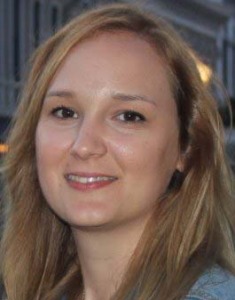 Leadership/International Collaboration/Commitment/Confidence
Leadership/International Collaboration/Commitment/Confidence
Leadership and learning are indispensable to each other.
—J.F. Kennedy
At the age of four, Marija Prskalo was forced to leave her home in Mostar, which she described as the most beautiful city in the former Yugoslavia and a symbol of multinational endeavor. In 1992 it became the scene of genocide and the worst of war crimes for four years. When Marija’s family returned, Mostar lay in ruins, divided between Muslims (Bosniaks) and Catholics (Croats). At age ten, Marija asked her parents if there were any good people in the world.
Marija says. “Every moment of my childhood, teenage years, and university years was influenced by the war. I cannot remember the exact moment when I realized that I want to fight for a better future, because every single moment of my life was, and still is, a motivation to work harder to improve the situation. All I dreamed of was a better future.” She eagerly accepted every opportunity to contribute to the recovery process, actively participating in many NGOs where she still holds positions of leadership. Although it is now officially a unified city with an infrastructure nearly renewed, Mostar is still divided.
“Almost everyone came out of the war with a mix of bad feelings towards those who were on the other side, and most probably everyone was scarred for the future. One can still feel the tensions,” Marija says, yet most of her peers have chosen to learn from the past, the most important lesson being that “violence is never a solution; it is a cause of bigger problems.”
Marija sees the Mostar International Model of the United Nations (MOSTIMUN) as the NGO most important to her. MOSTIMUN is an international conference that gathers over a hundred students, begun when French volunteer Victoire Rio wanted to give the young people of Mostar, living on different sides of town, opportunities to meet each other. She gathered ten students from the two segregated universities to collaborate and organize the conference, the first of its kind in Bosnia and Herzegovina. Marija was one of the original ten.
Marija was appointed as project manager of the MOSTIMUN conference two years ago. The five-day conference had been held every year in April since 2009, drawing students from some 25 different countries to Mostar. 100 attendees gathered to practice diplomatic language and skills while trying to solve the world’s most important issues, simulating organs of the UN. Managing MOSTIMUN for 2010 proved highly stressful to Marija, but “those 10 months of organization shaped me in a way I could not have imagined.” She coped with organizational and technical issues and met people who became close friends. Over five years, MOSTIMUN has attracted 400 participants, and Mostar now has a well connected network of young people who are proud of their origin, capable, and willing to work with people from different backgrounds to develop their society, the children of war intent on building a better future.
Marija also gained leadership experience in her role as representative of Law Faculty students to the Student Union of the University of Mostar, representing the interests of students, and organizing the regional debate tournament “DEBATIJADA,” humanitarian actions, seminars, and other activities.
Despite the wounds of war, conflict formed Marija into someone passionate about leading the fight for a better life. “A vital necessity of leadership is the ability to coordinate and balance potentially conflicting interests and issues of all involved.” She helped find financial and logistical support from government, international institutions, and other organizations. “I always knew how to deal with the challenges,” Marija says, “and I am ready to do the same in the future.”
